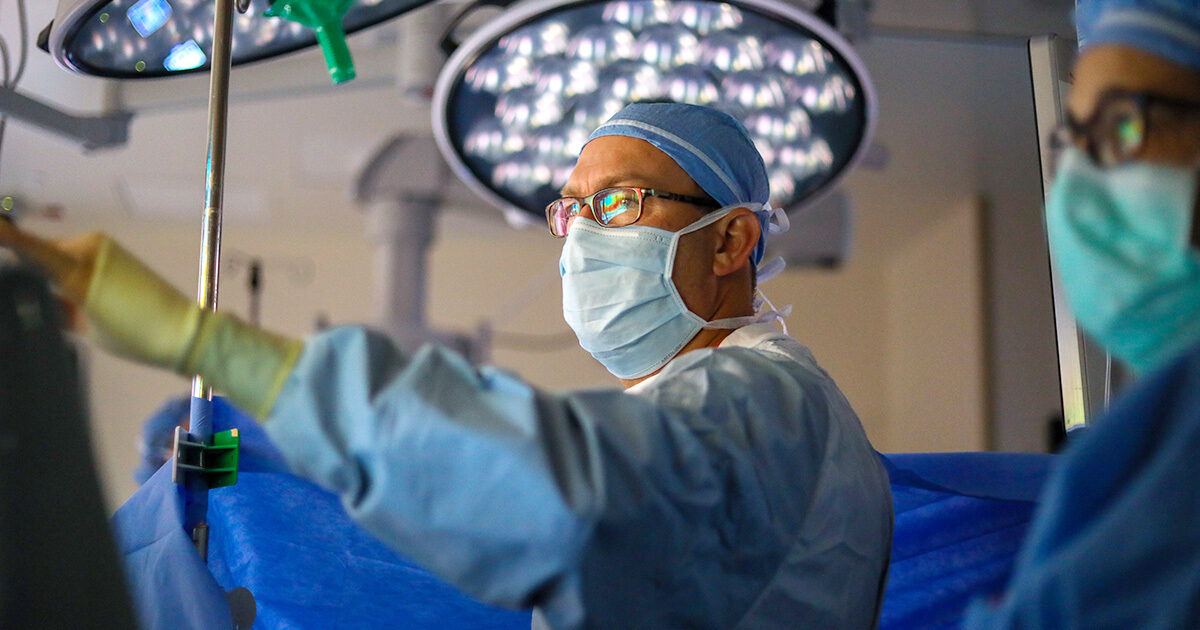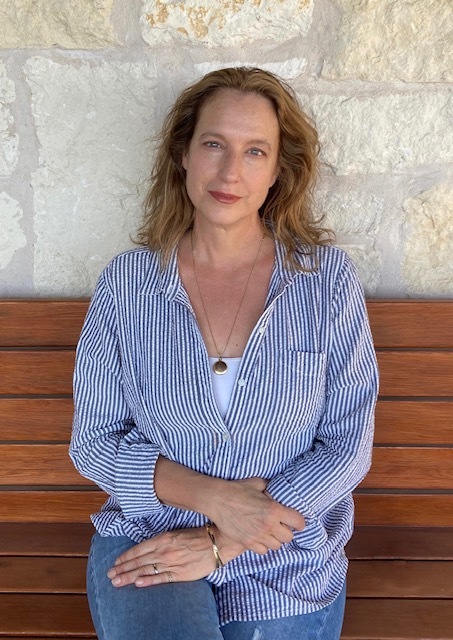Embracing Complexity
A puzzling condition left Katie Gentempo with countless questions. UT Health Austin clinicians helped her find answers
Reviewed by: Katie Gentempo; F.P. "Tripp" Buckley III, MD, FACS; and Corinne Jones, PhD, CCC-SLP
Written by: Lauren Schneider

UT alumnus Katie Gentempo did not know what was happening to her, but she knew something wasn’t right.
She started experiencing symptoms like difficulty swallowing and chest pain that made eating and drinking difficult. As her condition worsened over time, “even simple non-strenuous activities like walking the dogs, my volunteer activities, socializing with friends and family, or enjoying a nice meal out with my husband weren’t possible.”
On top of these symptoms, Katie experienced the frustration of not being able to find a treatment that worked. “I kept plugging away and advocating for myself until I was properly diagnosed,” she says.
Katie was ultimately diagnosed in 2020 with a condition called achalasia, a rare swallowing disorder that affects the sphincter between the esophagus and stomach, causing esophageal dysfunction over time. Clinicians from UT Health Austin helped her conquer the condition and return to her normal life.
A well-timed intervention
Following her diagnosis, specialists from Houston advised that she undergo surgery to restore esophageal function. She sought out an appointment with Dr. F.P. “Tripp” Buckley, MD, a surgeon who leads the Heartburn and Esophageal Disorders team within Digestive Health, a clinical partnership between Ascension Seton and UT Health Austin.

“I remember in one of my first meetings with Dr. Buckley, I had a million questions in a notebook,” she says. Together, Dr. Buckley and gastroenterologist Kavitha Kumbum, MD, addressed her concerns one by one.
When further testing confirmed she had achalasia, she was scheduled for a surgery called a Heller myotomy, a minimally invasive procedure that targets the lower esophageal sphincter, allowing food to pass through to the stomach.
Dr. Buckley is glad that Katie’s condition was identified and treated. “Because the symptoms of achalasia are variable and develop slowly over time, patients don’t necessarily go to the physician right away to start talking about their symptoms. Getting connected with someone who recognizes the variable symptoms of achalasia and can then perform the appropriate tests and operations is critical. We were happy that we could help Katie out. We designed Digestive Health and the combined gastroenterology and gastrointestinal surgery team for patients just like Katie”
Adjustments for patient and clinician
Unfortunately, there is no cure for achalasia and dysfunction of the esophagus persists. Patients often require a multidisciplinary team for the best results. As expected, Katie still had difficulties eating and drinking due to habits she developed to facilitate swallowing as her symptoms set in. “I had devised coping mechanisms such as holding food in one side of my mouth, moving it around with my tongue until I was somewhat comfortable allowing it to slide down into my throat, and ‘chewing’ liquids.”
Dr. Buckley put Katie in touch with Corinne Jones, PhD, a speech-language pathologist in the Mulva Clinic for the Neurosciences.
Katie describes her treatment involving chewing and swallowing a progressively wider variety of foods and beverages. “We started with textures and consistencies I was most comfortable with, then moved to more distressing textures. Amounts started with small spoonfuls increasing in volume as therapy progressed.”
Because this process began at the height of the pandemic in August 2020, Dr. Jones conducted these sessions virtually after collecting initial x-ray images in person. She says that telehealth sessions proved advantageous for Katie’s recovery.
“It was very helpful for her to be in her home environment where she felt safe and where we could change our approach on the fly because she had her whole kitchen right there. if something wasn’t working for her, she could run to the fridge and grab another food.”
Dr. Jones adds that unusual approaches are common in her line of work. “Treating swallowing disorders requires creative thinking, problem solving and a lot of work from the patient. I think I’m lucky in that people are really motivated to get back to eating and drinking the things that they want.”
“Truly compassionate care”
Katie demonstrated this dedication to recovery and has now fully restored her swallowing abilities.
She notes that she was so pleased with her experience that she transferred all of her and her husband’s care to UT Health Austin practitioners. “It wasn’t an easy solution or diagnosis, but I felt that at UT Health Austin I was being listened to and getting truly compassionate care.”
For more information about Digestive Health, click here or call 1-844-GI-AUSTIN (1-844-442-8784).
For information about UT Health Austin’s Pharyngeal High-Resolution Manometry service for swallowing difficulties, click here or call 1-833-UT-CARES (1-833-882-2737).